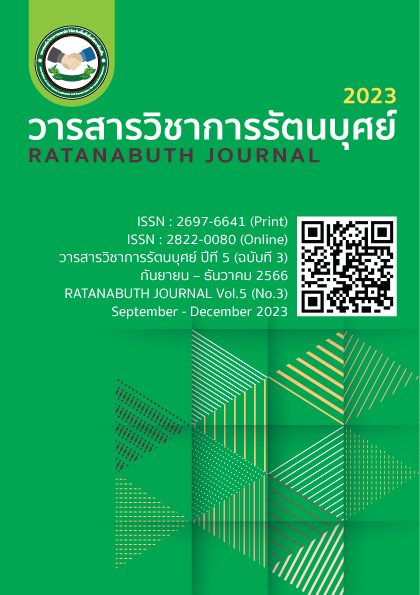Moral Behavioral Development Model for Higher Education Students Moral Behavioral Development Model for Higher Education Students
Main Article Content
Abstract
The study of ethical behavior involves understanding and predicting moral behavior based on factors of mental health, lifestyle, and social behavior. This article aims to present guidelines for developing ethical behavior for higher education students. The author uses the method of studying academic documents and then analyzing and synthesizing them and presenting them descriptively. The results of the study found that the moral Behavioral Development Model for Students; (1) Educates students about ethical principles, (2) Being the model for good ethical behavior, (3) Sets a code of conduct for students, (4) Encourages open dialogue, (5) Integration of ethics in the teaching and learning curriculum, (6) Promotion of self and social responsibility, (7) Providing resources and supporting the development of ethical behavior, and (8) Conclusion, evaluation, and development of ethical development guidelines for students.
Article Details

This work is licensed under a Creative Commons Attribution-NonCommercial-NoDerivatives 4.0 International License.
References
Bairaktarova, D., & Woodcock, A. (2017). Engineering Student’s Ethical Awareness and Behavior: A New Motivational Model. Science and Engineering Ethics, 23(4):1129-1157. doi: 10.1007/S11948-016-9814-X
Bairaktarova, D., Woodcock, A. (2017). Engineering Student’s Ethical Awareness and Behavior: A New Motivational Model. Sci Eng Ethics. 23, 1129–1157. https://doi.org/10.1007/s11948-016-9814-x
Barnfield, A.M.C. (2017). "Did I Do Good?": The Teaching and Learning of Ethics. Collected Essays on Learning and Teaching, 10, 197-202. doi: 10.22329/CELT.V10I0.4752.
Bazerman, H.M., & Gino, F. (2012). Behavioral Ethics: Toward a Deeper Understanding of Moral Judgment and Dishonesty. Annual Review of Law and Social Science. 8 (1), 85-104.
https://doi.org/10.1146/annurev-lawsocsci-102811-173815
Butt, A., & Ashar, A. (2020). Role of behavioral sciences in the development of professionalism among MBBS students. J Fatima Jinnah Med Univ [Internet]. 14Mar.2020 [cited 17Aug.2023];14(1):3-. Available from: https://www.jfjmu.com/index.php/ojs/article/view/693
Cardi, J.W., Penfield, D.R., Yoon, A. (2012). Does Tort Law Deter Individuals? A Behavioral Science Study. Journal of Empirical Legal Studies (Blackwell Publishing Inc). 9 (3), 567-603, https://doi.org/10.1111/j.1740-1461.2012.01263.x
Cicero, F.R. (2021). Behavioral Ethics: Ethical Practice Is More Than Memorizing Compliance Codes. Behav Analysis Practice,14, 1169–1178. https://doi.org/10.1007/s40617-021-00585-5
Cicero, F.R. (2021). Behavioral Ethics: Ethical Practice Is More Than Memorizing Compliance Codes. Behav Analysis Practice, 14, 1169–1178 (2021). https://doi.org/10.1007/s40617-021-00585-5
Drumwright, M., et al. (2015). Behavioral Ethics and Teaching Ethical Decision Making. Decision Sciences Journal of Innovative Education (John Wiley and Sons Ltd). 13 (3), 431-458. https://doi.org/10.1111/dsji.12071
Drumwright, M.E., Prentice, R.A., & Biasucci, C. (2015). Behavioral Ethics and Teaching Ethical Decision Making. Decision Sciences Journal of Innovative Education, 13(3):431-458. doi: 10.1111/DSJI.12071
Furtak, A. (2022). Developing ethical research behavior in doctoral students. South African Journal of Bioethics and Law, 15(2), 65-68. doi: 10.7196/sajbl.2022.v15i2.813
González Gallo, I., Ramírez, D. A., Villarreal, C. S., & Parra Bolaños, N. (2020). Efectos de un programa basado en el Análisis Conductual Aplicado en la enseñanza de Conceptos Éticos y Morales religiosos. Revista Innovación Digital Y Desarrollo Sostenible - IDS, 1(1), 20 - 29. https://doi.org/10.47185/27113760.v1n1.4
Hamrah, N.A. (2017). Ethics in behavioral science research Understanding methodology experts' views. Medical Ethics Journal. 11 (41), 25-36.
Hildt, E., et al. (2019). Empowering Graduate Students to Address Ethics in Research Environments. Cambridge Quarterly of Healthcare Ethics, 28 (3), 542 - 550. DOI: https://doi.org/10.1017/S096318011900046X
Hogan, A.J. (2017). The Study of Behavior: Organization, Methods, and Principles. Cambridge University Press. https://doi.org/10.1017/CBO9781108123792
Ingram, D., & Derdak, T. (2018). The Ethics of Development: An Introduction. London: Routledge.
Keahey, J. (2020). Ethics for Development Research. Sociology of Development. 6(4), 395–416. https://doi.org/10.1525/sod.2020.6.4.395
Leonard, L.N.K., Riemenschneider, C.K. & Manly, T.S. (2017). Ethical Behavioral Intention in an Academic Setting: Models and Predictors. J Acad Ethics, 15, 141–166. https://doi.org/10.1007/s10805-017-9273-2
Marangos, J., Astroulakis, N., & Triarchi, E. (2021). The Advancement of Development Ethics. Panoeconomicus (Economists' Association of Vojvodina). 68 (4), 441-460. https://doi.org/10.2298/PAN180518003M
McCann, G. (2020). The ethics of global development. The Routledge Handbook to Rethinking Ethics in International Relations; Routledge.
Morahan, M., (2015). Ethics in management. IEEE Engineering Management Review, 43,(4), 23-25, Fourth Quarter 2015, doi: 10.1109/EMR.2015.7433683.
Mubako, G., Bagchi, K., Udo, G. & et al. (2021). Personal Values and Ethical Behavior in Accounting Students. J Bus Ethics, 174, 161–176 (2021). https://doi.org/10.1007/s10551-020-04606-1
Mubako, G., Bagchi, K., Udo, G.J., & Marinovic, M. (2021). Personal Values and Ethical Behavior in Accounting Students. Journal of Business Ethics, 174(1), 1-16. doi: 10.1007/S10551-020-04606-1
Murphy, J.M. (2020). Guiding Students in Assessing Ethical Behavior in the Pharmaceutical Industry. Teaching Ethics. 19 (1),71-85
Schiffer, M.B. (2013). Science: A Behavioral Perspective. In: The Archaeology of Science. Manuals in Archaeological Method, Theory and Technique, vol 9. Springer, Heidelberg. https://doi.org/10.1007/978-3-319-00077-0_2
Shen Xia, (2010). Study on behavioral science-based coalmine safety culture construction. IEEE International Conference on Emergency Management and Management Sciences, Beijing, China, 2010, pp. 406-409, doi: 10.1109/ICEMMS.2010.5563414.
Shokri, M. (2021). Predicting Moral Behavior based on Psychological Health, Lifestyle and Prosocial Behaviors. Int. J. Ethics Soc 2021, 3 (3), 28-35, URL: http://ijethics.com/article-1-135-en.html
Sonaiya, B.E. (2013). Academic integrity and ethics: issues, guidelines, and recommendations. Ife Journal of Agriculture. 26 (1), 131-140.
Song, T., Ustin, N.P., Popov, M.L., & Mudarisov, M.M. (2017). The Educational Technology of Ethical Development for Students. EURASIA J Math Sci Tech Ed, 13 (6), 2095-2110. https://doi.org/10.12973/eurasia.2017.01216a
Swanson, D. (2016). Fictional Stories with Ethical Content: Guidelines for Using Stories to Improve Ethical Behavior. Ethics & Behavior, 26:7, 545-561, DOI: 10.1080/10508422.2015.1081095
Treviño, L. K., Weaver, G. R., & Reynolds, S. J. (2006). Behavioral Ethics in Organizations: A Review. Journal of Management, 32(6), 951–990. https://doi.org/10.1177/0149206306294258
Vargas-Elizondo, C. (2020). On the Role of Ethics in Shaping Technology Development. HighTech and Innovation Journal. 1 (2), 86-100. DOI: 10.28991/HIJ-2020-01-02-05
Winston, B.E. (2019). Ethical Behavior from the Old Testament. In: Biblical Principles of Being an Employee in Contemporary Organizations. Christian Faith Perspectives in Leadership and Business. Palgrave Macmillan, Cham. https://doi.org/10.1007/978-3-030-11169-4_3
Zameni, F. (2017). Correlation between Development of Ethical Behavior and its Consequences in Workplace Environment, and Organizational Health. Health Law Journal. 1 (3), 31-34.


